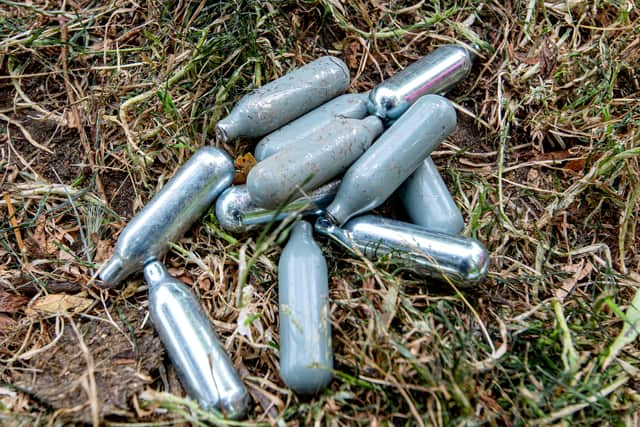Birmingham medic says laughing ban is ‘wrong approach’ - here’s why
and live on Freeview channel 276
Laughing gas - officially called Nitrous oxide and also known as ‘nos’ - has become the most commonly used drug among 16 to 24-year-olds in England after cannabis.
Its popularity stems from the ease in which it can be obtained - nearly half (47 per cent) of the users quizzed by OnePoll simply bought it online, with 36 per cent obtaining it from hardware stores.
Advertisement
Hide AdAdvertisement
Hide AdUsers release the gas into balloons from small silver canisters and then inhale it. As a result, discarded cannisters have become a common site in parks and town centres. Hundreds were found strewn across the floor of The Crane nightclub in Digbeth where Cody Fisher was murdered on Boxing Day.
A ban on the possession of nitrous oxide for recreational use is set to be announced today (Monday, March 27) as part of a package of measures to tackle anti-social behaviour. It goes against a recent report by the Advisory Council on the Misuse of Drugs (ACMD) which advised against an outright ban.
A health expert in Birmingham also says this is the “wrong approach” and others agree with Dr David Nicholl, who is a consultant neurologist and clinical lead at City Hospital.
What are the health dangers of laughing gas?
The drug slows brain responses, causing feelings of euphoria, relaxation and calmness. It can also cause giggling fits - hence the laughing gas nickname.
Advertisement
Hide AdAdvertisement
Hide AdHowever, doctors have noticed an increasing number of patients suffering the side-effects of excessive nitrous oxide consumption. In February a series of guidelines, endorsed by the Association of British Neurologists, were issued to hospitals nationwide to advise medics on how to identify and deal with excessive consumption.
The drug can interrupt the body’s metabolism of vitamin B12, which can cause spinal nerve damage resulting in a loss of sensation in the hands or feet. In extreme cases, a loss of balance can leave people unable to walk or even cause paralysis.
Of the 101 regular nitrous oxide users who responded to a OnePoll survey, just seven per cent had not suffered any ill health effects. A quarter had suffered a loss of sensation in the limbs, and 31 per cent have experienced numbness in the fingers and toes.
But alarmingly, around half of the users polled were oblivious to the health risks, which include nerve damage, impact on white blood cell count and even paralysis.


What has Dr David Nicholl said about the plan to ban laughing gas?
Advertisement
Hide AdAdvertisement
Hide AdDr David Nicholl believes nitrous oxide abuse is now "more dangerous than cocaine". He said: “I’ve been a neurologist for 21 years and have seen a definite change in how it’s being used, since the pandemic.
“Compared to before, now the volumes of nitrous oxide being consumed can be quite terrifying – up to 150 cylinders per day. It’s perceived as safe – and terms like ‘laughing gas’ are especially unhelpful because it makes it sound trivial.
"But the stuff bought on the street is pure nitrous oxide and not safe for human consumption. It is not the same substance used in hospitals, and it is toxic.”
On the move to ban laughing gas, Dr David Nicholl added: "In what way are we solving the problem by criminalising a 16-year-old with a couple of whip-its and a balloon on the street? All we would do is drive it underground.
Advertisement
Hide AdAdvertisement
Hide Ad“Restricted distribution is what’s recommended - what we need to do is target the supply chain, but you do still need a caveat for some kind of legitimate use. And we should be focusing on education so people are more aware of how dangerous it is when sold and used recreationally.”


Will a laughing gas ban be effective?
More than half of nitrous oxide users would ignore a Government ban and continue to use it, according to a study. The poll of 2,000 people found that eight in 10 users would simply source it from less reputable sellers if it were made illegal.
A quarter would continue to use it as openly as they do now, while one in five said they would probably replace it with a different drug like cannabis.
However, the survey by OnePoll found widespread public support for a ban on the substance - also known as laughing gas - which is linked to anti-social behaviour and a raft of health issues. Seven in 10 of those polled support government proposals to make it illegal, while just eight per cent would oppose it.
Advertisement
Hide AdAdvertisement
Hide AdA spokesman for OnePoll said: "It is worrying to see that even people who admit to using nitrous oxide are often unaware of the potentially life-changing side effects of inhaling the gas.
"With maternity units in hospitals having to reduce use of ‘gas and air’ because of the long-term risk to staff, it is probably as well to keep it out of the hands of ignorant users."
Comment Guidelines
National World encourages reader discussion on our stories. User feedback, insights and back-and-forth exchanges add a rich layer of context to reporting. Please review our Community Guidelines before commenting.
